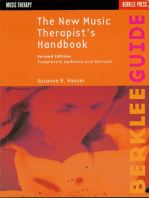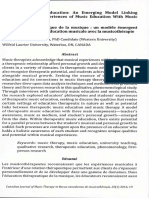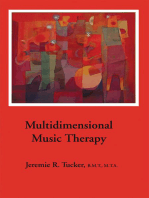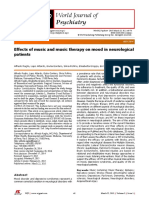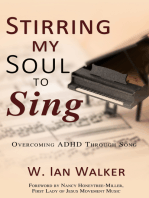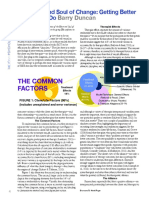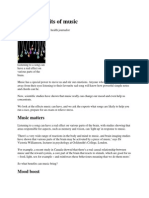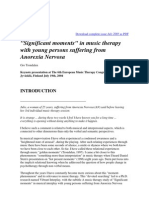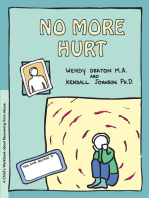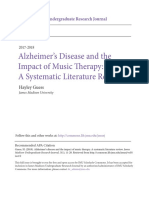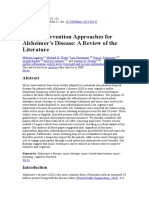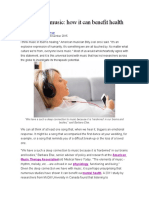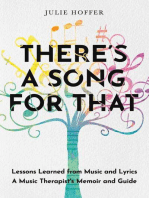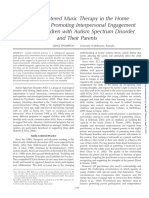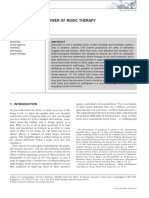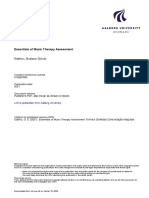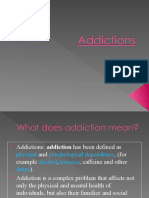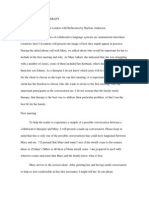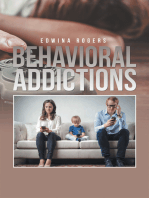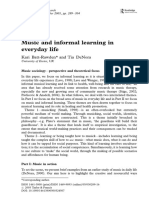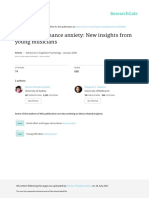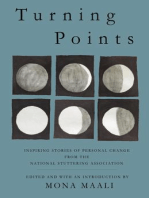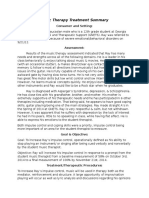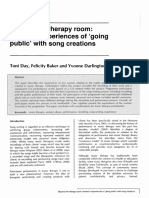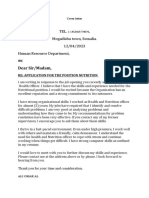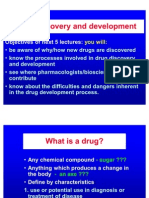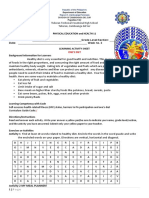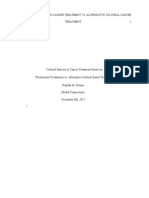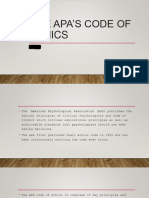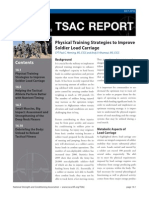Music Therapy and Recovery in Mental Health Seeking A Way Forward
Music Therapy and Recovery in Mental Health Seeking A Way Forward
Uploaded by
Luis AlbertoCopyright:
Available Formats
Music Therapy and Recovery in Mental Health Seeking A Way Forward
Music Therapy and Recovery in Mental Health Seeking A Way Forward
Uploaded by
Luis AlbertoOriginal Title
Copyright
Available Formats
Share this document
Did you find this document useful?
Is this content inappropriate?
Copyright:
Available Formats
Music Therapy and Recovery in Mental Health Seeking A Way Forward
Music Therapy and Recovery in Mental Health Seeking A Way Forward
Uploaded by
Luis AlbertoCopyright:
Available Formats
POSITION PAPERS | PEER REVIEWED
Music Therapy and Recovery in Mental Health:
Seeking a Way Forward
ey *, Catherine C
1 2 34 56
Tríona McC
McCaffr
affre Carr
arr , Hans P
Pett
etter
er Solli , Cherry Hense
1 Irish World Academy of Music & Dance University of Limerick, Ireland
2 Unit for Social and Community Psychiatry, WHO Collaborating Centre for Mental Health Services
Development, Queen Mary University of London, United Kingdom
3 Lovisenberg Diakonale Hospital, Oslo, Norway
4 The Norwegian Academy of Music, Oslo, Norway
5 Faculty of VCA & MCM, The University of Melbourne, Australia
6 Orygen, Centre of Excellence in Youth Mental Health, Melbourne, Australia
*triona.mccaffrey@ul.ie
Received: 27 March 2017 ; Accepted: 27 June 2017 ; Published: 1 March 2018
Editor: Avi Gilboa Reviewer: Kathy Murphy
Abstr
Abstract
act
As recovery is a prevailing vision for modern mental health services internationally,
it is timely to consider its current state of play in relation to music therapy practice.
This paper offers a theoretical perspective of this topic, by presenting the views of
four music therapy researchers situated in Australia, Ireland, Norway, and the Unit-
ed Kingdom. Each of the four authors completed doctoral research in music thera-
py in the past three years that is explicitly about, or related to, recovery in mental
health. Collectively all authors have considerable experience of providing individual
and group music therapy services in acute and community settings with adults and
adolescents within recovery-oriented services. This article aims to elaborate on the
implications of music therapy as a recovery-oriented practice, while presenting rec-
ommendations as to how music therapy can maximize support for recovery for our
patients and service users. It draws on our respective doctoral study findings and
lived experience of offering music therapy in recovery-oriented services, so as to pre-
sent a collective theoretical perspective to other music therapy practitioners who are
interested in this growing area. By doing so we hope to encourage discussion and
response from music therapists practising in various mental health contexts in the
service of developing the best possible music therapy services to our patients and
service users.
Keywords: Mental health, well-being, recovery, music therapy
ywords:
Situating our tte
ext
It is timely to consider the current state of play of recovery in relation to music therapy
practice as recovery is a prevailing vision for modern mental health services inter-
nationally. This paper offers a theoretical perspective of this topic, by presenting the
views of four music therapy researchers situated in Australia, Ireland, Norway, and the
United Kingdom. Each of the four authors completed doctoral research in music ther-
apy in the past three years that is explicitly about, or related to, recovery in mental
VOICES: A WORLD FORUM FOR MUSIC THERAPY | VOL 18 | NO 1 | 2018
Publisher
ublisher:: Grieg Academy Music Therapy Research Centre, Uni Research Health
Cop
opyright
yright:: 2018 The Author(s) DOI: https://doi.org/10.15845/voices.v18i1.918
VOICES: A WORLD FORUM FOR MUSIC THERAPY POSITION PAPERS
health. Collectively all authors have considerable experience of providing individual
and group music therapy services in acute and community settings with adults and
adolescents within recovery-oriented services. This article aims to elaborate on the im-
plications of music therapy as a recovery-oriented practice, while presenting recom-
mendations as to how music therapy can maximize support for recovery for our pa-
tients and service users. It draws on our respective doctoral study findings and lived
experience of offering music therapy in recovery-oriented services, so as to present a
collective theoretical perspective to other music therapy practitioners who are inter-
ested in this growing area. By doing so we hope to encourage discussion and response
from music therapists practising in various mental health contexts in the service of de-
veloping the best possible music therapy services to our patients and service users.
Intr
Introducing
oducing R
Rec
eco
overy
The topic of mental health recovery is one that has gained increased attention in the
music therapy literature (Chhina, 2004; Eyre, 2013; Kaser, 2011; Kooij, 2009; McCaf-
frey, Edwards, & Fannon, 2011; Solli, Rolvsjord, & Borg, 2013). Unlike traditional use
of the term within psychiatry to describe the elimination of symptoms and restora-
tion of social functioning, mental health recovery presents a way of thinking about and
living beyond the confines of a diagnosis of mental illness (Shepherd, Boardman, &
Slade, 2008). The seeds of mental health recovery were sewn in the late 20th centu-
ry by advocates of consumer and survivor movements of psychiatry who argued that
people with severe mental illness had far more hopes and ambitions beyond being free
of symptoms (Anthony, 1993). This is not to say that symptom reduction, or clinical
recovery, is unimportant for personal recovery. Instead it is viewed as subordinate to
personal and social aspects of well-being (Davidson & Roe, 2007).
Since the 1980s a new understanding of ‘recovery’ began to emerge in the mental
health literature. This moved beyond understanding recovery as an outcome that fo-
cused on extensive treatment in the hope of curing illness (Charland, 2012), and in-
stead, related to a deeply personal journey that is embarked upon as one recovers their
life beyond the confines of mental illness. Since that time, the recovery movement has
challenged fundamental principles of the medical model, demanding changes to ser-
vice delivery and treatment of those with mental illness. Such a position is not radical-
ly new in mental health care, and may be linked to earlier attempts to question covert
power inequalities in society and more specifically within healthcare (Foucault, 1961/
2001; Goffman, 1968). Indeed, through the process of deinstitutionalisation, mental
health services have already been part of a huge shift in power relations, and it has
been argued that a move to recovery orientated services may in fact be a further step
in beginning to address the inequalities within wider mental health care (Anthony,
1993). Recovery implies “a ‘bottom up’ approach to service development, as it begins
with the needs, preferences, and goals of the person in recovery” (Davidson, Tondora,
Lawless, O’Connell, & Rowe, 2009, p. 33). Such an approach offers a way of encom-
passing holistic, biographical and social data that can impact upon one’s life circum-
stances (Fox, 2012). Conversely, where services have sought to transform provision to
become more recovery-oriented, there have been critiques that through accommodat-
ing the wider needs of the professionals and services within these systems, the essence
of each individual’s recovery may be lost (Pilgrim & McCranie, 2013; Rose, 2014).
Mental health recovery is not easy to define with completeness nor is it synonymous
with cure. This is in part due to the heterogeneous nature of outcomes of mental ill-
ness, but also because of variations in its developments and applications within and
between countries (Davidson, O'Connell, Tondora, Styron, & Kangas, 2006; Turner-
Crowson & Wallcraft, 2002). One of the most commonly accepted definitions of re-
covery states that it is “a deeply personal, unique process of changing one’s attitudes,
values, feelings, goals, skills and/or roles” in order to live “a satisfying, hopeful, and
contributing life” (Anthony, 1993, p.7). Recovery refers to the real life experience of
the individual as one actively recovers “a new and valued sense of sense of self and
McCaffrey et al. Voices 2018, 18(1). https://doi.org/10.15845/voices.v18i1.918 2
VOICES: A WORLD FORUM FOR MUSIC THERAPY POSITION PAPERS
or purpose” (Deegan, 1988, p.11). It is unlike rehabilitation where services support
the social inclusion and autonomy of people with mental health problems through the
active process of ‘doing to’. This personal journey is exemplified through first-hand ac-
counts of recovery where concepts of empowerment, self-help, and advocacy are em-
phasised in overcoming the limitations of mental illness (Chadwick, 2007; Davidson,
2003; Deegan, 1988; Repper, 2000; Ridgway, 2001). These narratives remind mental
health practitioners that recovery is something that cannot be ‘done to’ another person
but rather something that can be facilitated and supported.
The need for clarity and consensus around the meaning of recovery has been raised
among the mental health community. In response to this, Leamy et al. (2011) carried
out a narrative synthesis of 97 papers that described or developed an intellection of
personal recovery from mental illness. The findings of this review were used to pro-
duce the CHIME conceptual framework that represents the processes of recovery to in-
clude: connectedness, hope and optimism about the future, identity, meaning in life,
and empowerment. The main characteristics of the recovery journey were also identi-
fied as 1) an active process 2) individual and unique to the individual 3) non-linear,
and 4) a journey of stages. The CHIME framework has since been validated in terms
of its five key processes of recovery, however differences between this and the earlier
review have been noted in relation to medication and diagnosis, practical support and
scepticism (Bird et al., 2014). Such efforts to bring clarity to the term ‘recovery’ have
been helpful while also serving as a reminder of the idiosyncratic nature of the recov-
ery journey where varying cultural and contextual factors can feature.
Similar to the issue of consensus of definition, recovery also has posed challenges
in terms of how it is realised in practice. At the heart of successful recovery-oriented
practice is collaborative, respectful, and mutually trusting relationships between those
who receive and deliver services (Slade, 2009). Hope, shared power, availability, open-
ness, and stretching boundaries have been identified by service users as important
ingredients of helpful relationships where recovery-oriented professionals have been
described as courageous individuals who are willing to address the complexities and
uniqueness of the change process in a collaborative manner (Borg & Kristiansen, 2004).
Repper and Perkins (2003) outlined the simplest and yet most essential part of the
relationship between service user and professional is the acknowledgement of shared
humanity:
The ability to recognize the humanity of those with whom we work, value them and rec-
ognize the importance of their lives forms the essential bedrock upon which supportive,
hope-inspiring relationships are based. An individual is much more likely to begin to value
himself/herself if others value him/her (p. 78).
A key concept of recovery-oriented practice is acknowledging that expertise may be
present in multiple guises. Recovery acknowledges that expertise can be acquired
through skill and/or training but also through lived experience (Greenhalgh, 2009;
Shepherd et al., 2008; Telford & Faulkner, 2004). Acceptance of these expertise man-
ifestations demands renegotiation of power, whereby the power differential of the
doctor-patient relationship traditionally espoused in the medical model is ameliorat-
ed (Kaminskiy, Ramon, & Morant, 2012). In a recovery-oriented context the individ-
ual’s lived experience becomes a source of shared expertise, directing decisions made
in partnership with professionals about the care that is received. This fosters collabo-
rative working between all parties concerned but on a deeper level, a shared sense of
humanity in the task of overcoming adversity. Such a shift in power differentials can
pose a challenge to mental health professionals as it may be construed as devaluing the
role of professional expertise and practice. Likewise, it can be challenging for service
users who have traditionally trusted in expert advice of mental health professionals to
find that, in recovery-oriented services, their lived expertise is a central source of in-
formation in deciding next steps of their care pathway. Therefore, the delivery of per-
son-centred health provision informed by multiple genres of expertise is neither simple
nor straightforward.
McCaffrey et al. Voices 2018, 18(1). https://doi.org/10.15845/voices.v18i1.918 3
VOICES: A WORLD FORUM FOR MUSIC THERAPY POSITION PAPERS
Several approaches to recovery-oriented care have been developed, manualised,
tried out and evaluated, such as REFOCUS, CHIME and INSPIRE (Slade & Wallace,
2017) however, these are primarily team-level practices with special focus on care-
planning. Hence, the present text is a contribution to widen the perspective of how
one therapeutic approach- music therapy- may provide support for recovery, whilst
holding in mind that music therapy is also often integrated as part of interdisciplinary
work.
An o
ovverview of our rrese
esear
arch
ch and implic
implications
ations ffor
or rrec
ecoovery
Within the authors’ collective research to date, all have focused upon the role and
meaning of music therapy in mental health care and to varying degrees, the role and
implications for recovery within this. Independently of each other, the authors recog-
nised the absence of service users’ voices and views from music therapy literature, a
feature perhaps symbolic of the emphasis of professional-as-expert. Underpinned by
the inclusive and collaborative message of mental health recovery, each of the authors
sought, in differing ways, to welcome service user perspectives of music therapy as a
valuable source of knowledge to inform practice. The following section provides suc-
cinct overviews of our doctoral studies and their related findings that support the con-
cept of music therapy as a recovery-oriented practice.
McCaffrey’s (2014) doctoral study aimed to develop high-quality processes for ser-
vice user evaluation of music therapy in mental health while reflecting upon the elicit-
ed feedback to gain a deeper understanding of how music therapy is received among
those who have attended sessions in mental health. Using both verbal and arts-based
evaluation processes that encompassed the views of nine service users, many findings
closely aligned to characteristics of recovery-oriented practice. These included that:
music therapy is attended because of a love or interest in music; there is not always
a distinction between music therapy and other music activities; music therapy is a
health-promoting resource, musical contribution is fostered in a group setting; and that
the music therapy environment is person-centred. Findings also uncovered some ser-
vice users’ challenges when first becoming involved in music therapy but also feelings
of tension and frustration when unfamiliar ways of engaging with music are presented
within sessions. These later aspects of personal experience in sessions were relatively
unnoticed in the music therapy literature at the time of this study’s conclusion. Over-
all, this study sought to honour and tune into service user perspectives as a valuable
source of knowledge to inform music therapy practice.
Carr’s doctoral research (2014) sought to explore processes and outcomes of acute
inpatient groups, integrating therapist and service users’ views and integrating quan-
titative and qualitative methods. Service users described three core processes of music
therapy: finding a means to engage with therapy and others, connecting to and ex-
pressing emotions, and building awareness of and making contact with others. Across
these processes, service users described a myriad of changes beyond psychiatric symp-
toms that were of high individual importance. The attributions participants gave for
change involved autonomous experiential learning ie. learning by doing, with support
and encouragement from the therapist (as opposed to teaching) and creation of a safe
space that afforded opportunities for creativity.
Solli’s doctoral study (2014) explored the user perspective of inpatients diagnosed
with psychosis. The study included a meta-synthesis of previous research containing
mental health service users’ first-hand accounts of experiences with music therapy
(Solli, Rolvsjord, & Borg, 2013). Here it was found that service users primarily expe-
rience music therapy in terms related to positive mental health and well-being (such
as having a good time, being together, feeling, and being someone) and only occasion-
ally in terms of symptom remission. Further, two case studies of patients admitted to
a psychiatric intensive care unit were conducted, based on participatory observation
and qualitative interviews of nine inpatients hospitalised at a psychiatric intensive care
unit (Solli & Rolvsjord, 2015; Solli, 2015). The participants here described music ther-
McCaffrey et al. Voices 2018, 18(1). https://doi.org/10.15845/voices.v18i1.918 4
VOICES: A WORLD FORUM FOR MUSIC THERAPY POSITION PAPERS
apy in terms of freedom, contact, well-being, and symptom relief, and illuminated mu-
sic therapy’s unique possibilities to afford agency and empowerment, promote a pos-
itive identity, develop positive relationships, and expand social networks. The study
concluded that music therapy affords a therapeutic and social arena where people with
mental health difficulties can work on their process of recovery, and hence is congru-
ent with recovery-oriented practice.
Hense’s doctoral study (2015c) investigated how young people’s musical identities
changed during experiences of, and recovery from, mental illness. Her participatory
research design aimed to align with recovery principles (Hense & McFerran, 2016;
Hense, McFerran, Killackey, & McGorry, 2016) by involving young people as collab-
orators through feminist informed qualitative interviews (Hense, 2015a) and holding
an agenda of action-based outcomes from the findings (Hense, 2015b). The first cycle
of research resulted in a constructed grounded theory illustrating how young people
came to music therapy with musical symptoms that expressed aspects of their illness
and subsequently utilised music therapy to transition these experiences into everyday
forms of music participation (Hense, McFerran, & McGorry, 2014). In line with recov-
ery processes, young people described wanting to use their music as means for ongoing
participation in the community, which resulted in the formation of the Youth Music
Action Group to address gaps in local music opportunities for young people with expe-
riences of mental illness (Hense, 2015b).
Although our respective doctoral research pursued different questions concerning
identity, lived experience, process, outcomes, and evaluation of music therapy in men-
tal health, each of the authors agreed that our studies were underpinned by the com-
mon thread of mental health recovery. This is exemplified in each of our efforts to fos-
ter the inclusion of service user voices in our respective studies. Having outlined our
individual approaches to practice and considered our research positions and findings,
the next section will draw upon our collective knowledge and experience to reflect on
how music therapy can support mental health recovery.
How ccan
an music ther
therap
apyy support rrec
ecoovery
ery??
Whether music therapy be offered in a mental health institution or in a community
setting, we are of the view that the core of our role involves building trust and relation-
ships with individuals, providing a space for musical expression and reflecting upon
this in the context of what the individual feels is relevant and needed in that moment
(Carr, Odell-Miller, & Priebe, 2012; Carr, 2014). For some, this may be a need to be
heard, or an experience of a different state, for example, peace. For others, therapy
means having the space to be listened to, for concerns to be thought about and advo-
cated for with the wider multidisciplinary team. Across all this work, the musical re-
lationship provides opportunities for service users to find ways of managing their dis-
tress, to reflect upon relationships with others, and to communicate experiences that
are not always easily put into words. Within this section we focus upon ways of work-
ing that may be specifically conducive to the recovery approach while at the same time
acknowledging that recovery is not the job of professionals, the mental health system,
nor is it a treatment ideology (Ness, Borg, Semb, & Karlsson, 2014). Hence, it is not our
job as music therapists to recover people because within this paradigm people cannot
be recovered as life is not an outcome (Davidson, Tondora, & Ridgeway, 2010).
The authors are mindful that attempts to adapt recovery as a model in psychiatric
practice has led to claims about the original notion of recovery being “hijacked" (Men-
tal Health Recovery Study Working Group, 2009). Likewise, it is acknowledged that
the desire to ‘model’ recovery has been perceived as a threat to creating an authentic
recovery-based framework (Glover, 2002). However, as recovery is increasingly being
applied by mental health stakeholders internationally to describe overall vision and
aims of practice (WHO, 2013; Slade, Adams, & O’Hagan, 2012), we see that there is a
need for music therapists to take stock of this international development towards over-
all recovery-oriented service provision. It is also an ideal opportunity to reflect upon
McCaffrey et al. Voices 2018, 18(1). https://doi.org/10.15845/voices.v18i1.918 5
VOICES: A WORLD FORUM FOR MUSIC THERAPY POSITION PAPERS
how music therapy can play a leading role in contributing to the transformation of
traditional service provision towards ideologies connected to the ideas of personal re-
covery.
Practising in a recovery congruent way may not involve ‘new’ models of music ther-
apy. However, it involves a radical shift in focus, from targeting deficits and function
as seen from the point of view of service systems and professionals to start placing
the person at the centre and acknowledging mental health problems as both personal
and social (Hummelvoll, Karlsson, & Borg, 2015). Existing literature stemming from
anti-oppressive (Baines, 2013), feminist (Hadley, 2006), resource-oriented (Rolvsjord,
2010), community music therapy (Stige & Aarø, 2012), and the empowerment per-
spective (Rolvsjord, 2004) detail how music therapy can not only involve critical con-
sciousness raising to support the ethos of recovery but also counteract objectifying
practice and behaviours embedded in the medical model of mental health systems. We
propose four central ways of maximising support for recovery in music therapy prac-
tice.
1. Recognising and respecting expertise by experience
Our first recommendation for providing music therapy in a recovery-oriented context
is that service users are regarded as ‘experts by experience’. A central assumption in
mental health recovery is that service users acquire expertise as a consequence of liv-
ing with mental illness (Anthony, Rogers, & Farkas, 2003). This expertise also extends
to knowledge that is assimilated as a result of one’s direct involvement with mental
health services and service users’ rights to have an equal stakeholder voice therein.
Such a stance positions service users as equal partners in the treatment process where-
by personal expertise by experience meets professional expertise by skill and/or train-
ing. This viewpoint, serves to remind practitioners that service users are the first and
foremost point of knowledge in terms of understanding factors that may hinder or
foster a personally fulfilling and meaningful life and the priorities placed upon them.
This openness to being led by the views and wishes of the service user is vital when
approaching music therapy as recovery-oriented practice. On an organisational lev-
el, practical implications for acknowledgement of service users’ expert role include to
start involving service users and user organisations in the development of music ther-
apy services. Another possibility, perhaps most relevant in community services, is to
include service users or people with user-experience as co-facilitators or partners.
2. Awareness and integration of processes at the core of recovery
Recovery-oriented practice is recognised by a focus on supporting personally defined
recovery where “individuals are supported to define their own needs, goals, dreams,
and plans for the future to shape the content of care” (Le Boutillier et al., 2011, p.
1474) rather than by generalised and manualised interventions based on diagnosis
and function. Hence, focusing on factors that promote recovery means treatment goals
and approaches in music therapy should as far as possible be determined in mutual
collaboration with the therapist on the basis of the person’s own preferences. In ad-
dition, we propose that music therapists are mindful of the five key processes that
have been found central to the recovery journey and recommend the aforementioned
CHIME conceptual framework as a valuable source of synthesised knowledge in this
regard (Leamy et al., 2011). Based on service users’ own personal experiences of re-
covery, the five recovery processes are:
1. Connectedness (Peer support and support groups, relationships, support from oth-
ers, being part of the community).
2. Hope and optimism about the future (belief in possibility of recovery, motivation to
change, hope-inspiring relationships, positive thinking and valuing success, hav-
ing dreams and aspirations.
McCaffrey et al. Voices 2018, 18(1). https://doi.org/10.15845/voices.v18i1.918 6
VOICES: A WORLD FORUM FOR MUSIC THERAPY POSITION PAPERS
3. Identity (dimensions of identity, rebuilding/redefining positive sense of identity,
overcoming stigma).
4. Meaning in life (meaning of mental illness experiences, spirituality, quality of life,
meaningful life and social roles, meaningful life and social goals, rebuilding life)
5. Empowerment (personal responsibility, control over life, and focusing upon
strengths).
We agree with authors of this conceptual framework who posit that one possible way
to approach recovery in mental health practice is to evaluate practice in terms of its
impact on these five named processes (Leamy et al., 2011). Interestingly, but maybe
not so surprisingly, studies of service users’ experiences of music therapy convey narra-
tives of recovery that are congruent with those of the CHIME study (Ansdell & Mehan,
2010; Carr, 2014; Hense, McFerran, Killackey, & McGorry, 2016; McCaffrey & Ed-
wards, 2015; McCaffrey & Edwards, 2016; Rolvsjord, 2010; Solli, Rolvsjord, & Borg,
2013; Solli & Rolvsjord, 2015). This suggests that there is already some resonance be-
tween some established central processes of recovery and personal accounts of how
service users experience music therapy in practice. Such resemblance highlights the
potential that music therapy may have in supporting service users on their recovery
journey.
3. Being resource-oriented
As recovery emphasises the individual’s personal autonomy and strengths, we recom-
mend that the overall aims, goals and objectives of therapy promote service users’
resources and goals rather than highlighting perceived deficits or weaknesses as tra-
ditionally encompassed by a medical model of practice (Davidson, 2003; Davidson &
Roe, 2007). In developing a protocol for resource-oriented music therapy, Rolvsjord,
Gold, and Stige (2005) described six essential therapeutic principles for music therapy
which included: 1) to focus on the client’s strengths and potential, 2) to recognise the
client’s competence related to his or her therapeutic process, 3) to collaborate with the
client concerning the goals of therapy and the methods of working, 4) to acknowledge
the client’s musical identity, 5) to be emotionally involved in the music, and 6) to fos-
ter positive emotions. We put forward these six guiding principles to amplify service
user resources so as to ameliorate against the potentially limiting impact of mental ill-
ness. Simultaneously, these principles help to identify and build on a person’s strengths
and interests in order for the person to have an identity and a life beyond the label of
being mentally unwell (Davidson & Roe, 2007). Many examples of resource-oriented
practice have been offered by Rolvsjord (2010). Other leading mental health profes-
sionals have acknowledged the resource-oriented capacity of creative music therapy in
encouraging expressive skills, personal growth, and autonomy (Priebe, Omer, Giacco,
& Slade, 2014).
It is important to clarify that a strong focus on the person’s resources in music ther-
apy does not imply avoidance of problems and illness, as has been an expressed con-
cern in relation to a resource-oriented practice (Pedersen, 2014). Rather, we argue in
line with Rolvsjord (2010) that there is a need for a better balance between the focus
on resources and problems, as both are always interacting aspects in the therapeutic
process. However, as many service users are struggling with stigma, hopelessness and
low motivation (Slade, 2009), we argue that a greater focus on wellbeing and positive
aspects of mental health in music therapy is warranted.
4. Being community-oriented
As people with mental health problems often experience stigma, disempowerment, and
social exclusion, processes of recovery are closely interlinked with social processes
of change (Onken, Craig, Ridgway, Ralph, & Cook, 2007; Repper & Perkins, 2003).
Hence, a core aim of recovery-oriented services is to support people who live with
mental illness to reintegrate into society and to live as equal citizens (Le Boutillier et
McCaffrey et al. Voices 2018, 18(1). https://doi.org/10.15845/voices.v18i1.918 7
VOICES: A WORLD FORUM FOR MUSIC THERAPY POSITION PAPERS
al., 2011). In accordance with this, there has been a decentralisation and deinstitution-
alisation of mental health care, and mental health services are more often provided in
the community. Music therapy has shown to be a good arena for developing positive
relationships with others, expanding social networks, and to help with the transition
from hospital settings to everyday life in various social and cultural arenas (Ansdell &
DeNora, 2016; Jampel, 2007; Rolvsjord, 2013; Solli, 2015). We propose that to maxi-
mize support for recovery, music therapy needs to include an orientation towards so-
cial participation and inclusion. This ethos does not dismiss the notion of recovery-ori-
ented practice being carried out in acute settings where wider social and community
contacts are limited. Rather, it is encouraged that in such circumstances that social
contact and preservation of community links are promoted as far is possible.
Practical implications of a stronger community orientation include taking music
therapy out of the music therapy room and into various social arenas, either within an
institution or in the community itself. Here it is possible to expand music therapeutic
practice to include active music making in as choirs or bands, and to include perfor-
mances and projects in public spaces (Jampel, 2007; Ansdell & DeNora, 2016).
To propose that working in recovery-congruent ways is new to music therapy,
would dismiss decades of valuable discourse and work. For example, within the UK,
Mary Priestley documented running open performative music groups that included
staff within the hospital institution (Priestley, 1994). However, examination of some of
the principles guiding different music therapy approaches used in mental health care
suggests that a recovery-congruent approach may not always easily align with the the-
oretical premises underpinning such approaches. It is therefore perhaps not surprising
that later evolutions of music therapy that have emerged in the context of more criti-
cal interdisciplinary dialogue about health in society bear greater synergy to recovery
philosophy and indicate an increasing engagement with recovery-congruent ways of
working.
Bringing rrec
ecoovery ideol
ideology
ogy tto
o rre
ealit
lityy: Is
Issues
sues and cconc
oncerns
erns
In this final section, we draw on our collective experience as music therapy practi-
tioners and researchers who have advocated for the realisation of a recovery-oriented
approach at mental health services in our respective countries. In particular we bring
to discussion some of the challenges and concerns that each of us have encountered
through practice but also through processes of inquiry that have been aligned within
the recovery tradition (Carr, 2014; Hense, 2015a, 2015b, 2015c; Hense, McFerran, &
McGorry, 2014,, 2016; McCaffrey, 2014; McCaffrey & Edwards, 2016; Solli, Rolvsjord,
& Borg, 2013; Solli & Rolvsjord, 2015; Solli, 2015).
An often mooted concern around recovery is that placing service users as experts by
experience can devalue the training and expertise of mental health professionals. While
acknowledging the benefits of self-help and peer support, we believe that the potential
contribution of professional help should not be devalued in striving towards a more re-
covery-oriented system. Recovery directly challenges traditional notions of the source
of expertise and demands that mental health professionals recognise and learn from
service users’ own knowledge about themselves, their needs, and skills. This means ac-
knowledging the limitations of our own training, knowledge, skills, and strategies for
change in directly meeting each unique individual. It requires prioritisation of close
and careful attention to what service users appraise as important and necessary.
As Deegan (2003) pointed out, “people in recovery and the mental health profes-
sionals can work together to expand opportunities for recovery” (p.374). Rather than
devaluing, we are of the view that such a model of working places a greater responsi-
bility for therapists to have the skills and competencies to communicate and respond
with sensitivity, collaborate and empower individuals in decision making. While chal-
lenging, this is of utmost relevance particularly when service users are at their most
vulnerable and may not be able to easily articulate thoughts, feelings, or needs. With-
in the UK, such skills and competencies are highlighted by national guidelines (NICE,
McCaffrey et al. Voices 2018, 18(1). https://doi.org/10.15845/voices.v18i1.918 8
VOICES: A WORLD FORUM FOR MUSIC THERAPY POSITION PAPERS
2011) and within the regulatory body of music therapists (HCPC, 2013) including the
competency to base relationships with service users “on mutual respect and trust,”
(p.7) “”to communicate effectively (p.9), and to work “in partnership with service
users, other professionals, support staff and others" (p. 10).
A related concern to that of devaluing professional training and expertise, might be
expressed regarding the interface between music therapy and wider community mu-
sic services. Thinking again about power relations, the changing emphasis from ex-
perts ‘doing to’ to ‘working in partnership’ to define needs of care (Gilburt, Slade,
Bird, Oduola, & Craig, 2013), could lead, for example, to service users opting to access
participatory music over music therapy as a means of continuing wellbeing. Does the
adoption of recovery-oriented services therefore pose a threat to traditional models
of music therapy? Research on service users’ experiences of music therapy in men-
tal health care suggests otherwise, in that there is still a clear role for music therapy
as one means of enabling a reconnection with musical resources (Ansdell & Meehan,
2010; Carr, 2014; McCaffrey & Edwards, 2016; Solli, 2014; Solli, Rolvsjord, & Borg,
2013; Solli & Rolvsjord, 2015). These studies suggest music therapy is often seen with-
in a continuum of ways in which music can be used to support mental health (Ansdell,
2015; Ansdell & Meehan, 2010; Carr, 2014; McCaffrey et al., 2011). Rather than pose
a threat, recovery-orientation opens up an opportunity to consider the wider possibil-
ities of how the spectrum of music therapy - community music therapy – community
and participatory music services might work together in supporting clients and com-
munities. Issues and opportunities arising from this are illustrated and considered in
the following scenarios:
Scenario 1
A service user identifies that they currently feel isolated in their consultation with the psy-
chiatrist. The service user is a skilled musician but has ceased to play with others after onset
of acute symptoms which led to a breakdown in relationships with other musicians in their
group. The person has encountered many types of psychological therapy over the years and
currently has no wish to engage in further therapy. The psychiatrist is not familiar with arts
opportunities in the community but is aware of a music therapy group and suggests this might
be beneficial.
In this scenario, whilst the psychiatrist is working with the service user’s own iden-
tified needs, at this time, the service user has no wish to enter into therapy. A referral
to music therapy might not be the best way forward if the person does not wish or feel
ready to enter into this to explore relational issues in depth with others in a group.
Conversely, whilst support to access community based music opportunities may be an
alternative means of addressing isolation, this person again, may feel vulnerable about
returning to making music with others. A recovery-oriented response, might be the
psychiatrist explaining this in more detail to the person and asking for their views and
preferences. They might jointly agree for the psychiatrist to put them in touch with
the music therapist to speak further about possibilities for individual music therapy or
explore alternative creative lessons or groups available in the local area.
Scenario 2
A service user is about to be discharged from hospital. She has accessed an open music thera-
py group on the ward for the first time and found this helpful. For the first time, she has sung
in a group and identified that this makes her feel good and is a way to get to know and be
with others. She wishes to continue musical participation but is anxious about how she might
manage this and staying well on discharge. The music therapist discusses options available
with the service user and they jointly agree for her to be referred to a music therapy group
in her local area on discharge and for the music therapist to liaise with her occupational
therapist and care coordinator to help them identify a local choir linked to wider community
initiatives.
McCaffrey et al. Voices 2018, 18(1). https://doi.org/10.15845/voices.v18i1.918 9
VOICES: A WORLD FORUM FOR MUSIC THERAPY POSITION PAPERS
Here, the service user has had a helpful experience of music therapy, wishes to con-
tinue but also has recognised for the first time, ways in which music and wider music
participation might support her recovery. The multidisciplinary team work together
with the service user to ensure she is supported post-discharge through referral to a
music therapy group. The team recognise her wish for wider musical participation in
the community as a resource she has identified for support in her recovery and togeth-
er provide signposting and support to access this.
Scenario 3
A lady with a long history of service use is admitted to an acute ward due to increased agi-
tation at home. She can communicate verbally but her speech is not always clear and can be
difficult to understand. She joins the open music therapy group and participates fully in the
music-making. During the admission her medication is changed to a daily injection, which
she experiences as painful, frightenin,g and makes her fearful and angry at nursing staff. She
begins to shout and fight staff, throwing objects at them. As a result, she is put onto continual
staff observation and is unable to leave her room. Staff members are fearful of her and cease
to listen to what she is communicating. The music therapist offers individual sessions with
the observing staff member present which she agrees to with enthusiasm. The therapist does
not bring small instruments in case she attempts to throw these at staff but brings a guitar
which they are able to share. They sit together on the floor and improvise songs together. Af-
terwards, she says these songs give her strength and expresses her anger at what is happening
to her. The therapist notices that it takes a long time for the lady to be ready to end the ses-
sions. She shares this observation with the lady and wonders if access to music at other times
of the week might be helpful? The lady agrees fully, so the therapist advocates for access to
a CD player with the nursing staff. She is given access to this, along with occupational ther-
apy assistants visiting to play CDs and sing together. The following week, the lady is taken
off observation. She re-joins the music therapy group and expresses appreciation for both the
access to music and the opportunity to connect to feelings of strength as a means of internal
support.
This final scenario suggests a number of issues in relation to the interplay between
expertise and collaboration to meet presenting needs. The medical team recognise that
her medication needs to be changed, but the service user experiences this as frighten-
ing and painful. Her resulting response prevents her from accessing a resource (mu-
sic therapy group) which she uses regularly and leads to a dynamic of fear between
both service user and staff. The therapist formulates an opinion as to what might be
happening in their sessions, but is led first and foremost by what is communicated by
the service-user herself and checks in with the service user as to whether this is what
she herself, feels she needs. The therapist recognises the importance of connecting to
an internal resource (strength) at this time of stress and supports this musically. She
advocates for the service user, negotiating access to an object with staff, explaining
the risks and benefits and offering suggestions to staff as to how to mitigate risks. By
recognising the importance of ‘strength’ and promoting access to music, the service
user suggests the experience gave her hope and a different means of interacting with
and connecting to staff beyond the difficult and frightening experiences of being given
medication.
Across all three scenarios, such discussions are dependent upon the availability and
awareness of resources both within and outside the healthcare system and an openness
and willingness of professionals to listen to and support service users in making their
needs and preferences known. They are also dependent upon the level and depth of
therapeutic work the service user wishes to have and is ready to enter into. The scenar-
ios underpin the complexity of the shift required of professionals and services operat-
ing within the medical model alone, to become more recovery-orientated as a service.
Morant’s study (2006) identified how mental health practitioners are continually faced
with navigating such tensions through ‘compromise solutions’, often balancing seem-
ingly incompatible social representations (for example, evidence base, local policy and
McCaffrey et al. Voices 2018, 18(1). https://doi.org/10.15845/voices.v18i1.918 10
VOICES: A WORLD FORUM FOR MUSIC THERAPY POSITION PAPERS
service user and carer views) to identify how best to meet service users’ needs. Dilem-
mas described in Morant’s study included conflicting information regarding the best
treatment options available for service users, remaining person-centred, and balancing
needs as defined within the medical model with wishes that may not be easily met by
medical services alone but are identified as important, if not more so by the users of
these services.
Conclusion
When commencing this paper, the authors recognised that little collective discussion
has occurred in the literature to date about music therapy and mental health recovery.
Therefore this paper was written with the aim of commencing such a theoretical dis-
cussion with the hope of stimulating wider and enlivened debate about this topic
among music therapists working in this field. Our collaboration as authors of this paper
required much reflection, time, and negotiation in our endeavour to scaffold a theoret-
ical framework around recovery-oriented music therapy in mental health. It demanded
patience as we gained an understanding of each other’s professional and lived exper-
tise of working in recovery-oriented mental health services in different corners of the
world. Most difficult of all was overcoming our concerns that in publishing this paper,
we would outline a differing approach to music therapy provision than peers who have
adopted a treatment-based and indeed dominant approach to practice that is heavily
influenced by the medical-model. In many ways our experiences of writing this paper
mirror some vital components of recovery-oriented relationships between service users
and staff where flexibility, negotiation, and collaboration feature within a framework
that offers an alternative way forward. Furthermore, we also became acutely aware
that there are many layers of recovery, from that which is held and owned by service
users, to service awareness and responsiveness, team interactions but also recovery as
encompassed in music therapy.
We concur with the view that emerging discussions and use of the recovery model
in music therapy “represents in our view something of a recovery of the core of music
therapy practice, theory and research itself” (Ansdell & DeNora, 2016, p. 224). This
suggests that recovery orientation moves beyond professional practice to the central
beliefs and value systems of music therapists (Slade, Amering & Oades, 2008; Borg &
Kristiansen, 2004). Such values are congruent with those of social justice (Curtis, 2012;
Vaillancourt, 2012) and anti-oppressive practice (Baines, 2013). Likewise we acknowl-
edge that some existing models of music therapy may be challenged more so than oth-
ers to fully encompass the principles we have described in this paper. This may be rel-
evant to behavioural, psychoanalytic, psychodynamic, and other approaches to music
therapy practice in mental health that are aligned to principles of the medical-model
where clinical recovery and professional expertise are emphasised at the risk of de-
valuing service users’ lived experience. We acknowledge that music therapists working
within such models may already be adapting their practice to incorporate these princi-
ples and hope that this paper may serve as a means of encouraging further sharing of
ideas, challenges, practice, and discussion. Recovery orientation suggests a balance of
the therapist’s formulation and practices with ongoing dialogue with service users to
reach a shared understanding of current issues, needs and ways in which music ther-
apy, community music or wider psycho-social programmes might help to address and
meet these. It demands that therapists acknowledge resources and potential of service
users and the importance of connectedness, hope, identity, meaning in life, and em-
powerment (CHIME) beyond deficits or pathology alone. As such, a recovery-oriented
approach suggests a meeting of two experts- professional and service user. Such an
approach requires an integrated recovery-oriented approach across services, yet offers
the potential for much richer, nuanced and person-centred options to support service
users throughout their recovery.
McCaffrey et al. Voices 2018, 18(1). https://doi.org/10.15845/voices.v18i1.918 11
VOICES: A WORLD FORUM FOR MUSIC THERAPY POSITION PAPERS
Acknowl
Acknowledg
edgements
ements
Our thanks are due to Professor Randi Rolvsjord, the Grieg Academy, University of
Bergen, for being a critical friend in preparing this paper.
Ref
efer
erenc
ences
es
Ansdell, G. (2015). How music helps in music therapy and everyday life. Farnham, England:
Ashgate.
Ansdell, G., & Meehan, J. (2010). Some light at the end of the tunnel. Music and Medicine,
2(1), 29-40, https://dx.doi.org/10.1177/1943862109352482.
Ansdell, G., & DeNora, T. (2016). Musical pathways in recovery. Community music therapy in
mental wellbeing. New York, NY: Routledge.
Anthony, W. A. (1993). Recovery from mental illness: The guiding vision of the mental health
service system in the 1990s. Psychiatric Rehabilitation Journal, 16(4), 11-23,
http://psycnet.apa.org/doi/10.1037/h0095655.
Anthony, W. A., Rogers, E. S., & Farkas, M. (2003). Research on evidence-based practices:
Future directions in an era of recovery. Community Mental Health Journal, 39(2), 101-114,
https://dx.doi.org/10.1023/A:1022601619482.
Baines, S. (2013). Music therapy as an anti-oppressive practice. The Arts in Psychotherapy, 40,
1-5, https://dx.doi.org/10.1016/j.aip.2012.09.003.
Bird, V., Leamy, M., Tew, J., Le Boutillier, C., Williams, J., & Slade, M. (2014). Fit for
purpose? Validation of a conceptual framework for personal recovery with current mental
health consumers. Australian and New Zealand Journal of Psychiatry, https://dx.doi.org/
10.1177/0004867413520046.
Borg, M., & Kristiansen, K. (2004). Recovery-oriented professionals: Helping relationships in
mental health services. Journal of Mental Health, 13, 493-505, https://dx.doi.org/10.1080/
09638230400006809.
Carr, C. (2014). Modelling of intensive group music therapy for acute adult psychiatric inpatients.
London, England: Queen Mary University of London.
Carr, C., Odell-Miller, H., & Priebe, S. (2012). A systematic review of music therapy practice
and outcomes with acute adult psychiatric in-patients. PLoS ONE, 8(8), e70252,
https://dx.doi.org/10.1371/journal.pone.0070252.
Chadwick, P. K. (2007). Peer-professional first-person account: Schizophrenia from the
inside—phenomenology and the integration of causes and meanings. Schizophrenia Bulletin,
33, 166-173, https://dx.doi.org/10.1093/schbul/sbl034.
Charland, L. (2012). Benevolence and discipline: the concept of recovery in early nineteenth-
century moral treatment. In A. Rudnick (Ed.), Recovery of people with mental illness :
Philosophical and related perspectives (pp. 65-67). Oxford: Oxford University Press.
https://doi.org/10.1093/med/9780199691319.003.0005.
Chhina, C. (2004). Music therapy and psychosocial rehabilitation: Towards a person-centered
music therapy model. Canadian Journal of Music Therapy, 11, 8-30.
Curtis, S. (2012). Music therapy and social justice: A personal journey. The Arts in
Psychotherapy, 39, 209-213, http://dx.doi.org/10.1016/j.aip.2011.12.004.
Davidson, L. (2003). Living outside mental illness: Qualitative studies of recovery in schizophrenia.
New York, NY: NYU Press.
Davidson, L., O'Connell, M., Tondora, J., Styron, T., & Kangas, K. (2006). The top ten concerns
about recovery encountered in mental health system transformation. Psychiatric Services, 57,
640-645, https://dx.doi.org/10.1176/appi.ps.57.5.640.
Davidson, L., & Roe, D. (2007). Recovery from versus recovery in serious mental illness: One
strategy for lessening confusion plaguing recovery. Journal of Mental Health, 16(4),
459-470, https://dx.doi.org/10.1080/09638230701482394.
McCaffrey et al. Voices 2018, 18(1). https://doi.org/10.15845/voices.v18i1.918 12
VOICES: A WORLD FORUM FOR MUSIC THERAPY POSITION PAPERS
Davidson, L., Tondora, J., Lawless, M. S., O'Connell, M. J., & Rowe, M. (2009). A practical
guide to recovery-oriented practice: tools for transforming mental health care. New York, NY:
Oxford University Press. pp. 33-61.
Davidson, L., Tondora, J., & Ridgeway, P. (2010). Life is not an “outcome”: Reflections on
recovery as an outcome and as a process. American Journal of Psychiatric Rehabilitation,
13(1), 1-8, http://dx.doi.org/10.1080/15487760903489226.
Deegan, P. E. (1988). Recovery: The lived experience of rehabilitation. Psychosocial
Rehabilitation Journal, 11(4), 11-19, http://psycnet.apa.org/doi/10.1037/h0099565.
Deegan, G. (2003). Discovering recovery. Psychiatric Rehabilitation Journal, 26, 368-376,
http://psycnet.apa.org/doi/10.2975/26.2003.368.376.
Eyre, L. (2013). Adults in a recovery model setting. In L. Eyre (Ed.), Guidelines for music
therapy practice in mental health (Adobe Digital Editions version). Gilsum, NH: Barcelona.
http://www.barcelonapublishers.com/e-books.
Foucault, M. (1961/2001). Madness and civilization: A history of insanity in the age of reason.
Oxon, UK: Routledge. https://doi.org/10.4324/9780203278796.
Fox, J. (2012). The recovery concept: The importance of the recovery story. In S. Walker (Ed.),
Modern mental health: Critical perspectives on psychiatric practice (pp. 49-64). Albans, UK:
Critical Publishing Ltd.
Gilburt, H., Slade, M., Bird, V., Oduola, S., & Craig, T. K. J. (2013). Promoting recovery-
oriented practice in mental health services: A quasi-experimental mixed-methods study.
BMC Psychiatry, 13, 167, https://dx.doi.org/10.1186/1471-244X-13-167.
Glover, H. (2002). Developing a recovery platform for mental health service delivery for people with
mental illness/distress in England: A discussion paper. United Kingdom: National Institute of
Mental Health.
Goffman, E. (1968). Asylums: Essays on the social situation of mental patients and other inmates.
London, England: Penguin group.
Greenhalgh, T. (2009). Patient and public involvement in chronic illness: Beyond the expert
patient. BMJ: British Medical Journal, 338, 629-631, http://dx.doi.org/10.1136/bmj.b49.
Hadley, S. (2006). Feminist perspectives in music therapy. Gilsum, NH: Barcelona Publishers.
Health and Care Professions Council (HCPC), (2013). Standards of proficiency- Arts Therapists.
Retrieved from http://www.hpc-uk.org/publications/standards/index.asp?id=39.
Hense, C. (2015a). Feminist-informed collaborative interviews with young people recovering
from mental illness. In C. Hense, G. McGibbon, C. Philips, & S. Rudolf (Eds.), Researching for
Social Change (pp. 15-32). Melbourne: Melbourne University Social Equity Institute.
Hense, C. (2015b). Forming the youth music action group. Voices: A World Forum for Music
Therapy, 15(1), https://dx.doi.org/10.15845/voices.v1i1.810.
Hense, C. (2015c). Musical identities of young people recovering from mental illness. University of
Melbourne, Australia. Unpublished doctoral thesis, Retrieved from, http://hdl.handle.net/
11343/55361.
Hense, C., & McFerran, K. S. (2016). Toward a critical grounded theory. Qualitative Research
Journal, 16(4), 402-416.
Hense, C., McFerran, K. S., & McGorry, P. (2014). Constructing a grounded theory of young
people's recovery of musical identity in mental illness. The Arts in Psychotherapy, 41,
594-603, https://dx.doi.org/10.1016/j.aip.2014.10.010.
Hense, C., McFerran, K. S., Killackey, E., & McGorry, P. (2016). Youth Voice Journal. Retrieved
from, https://youthvoicejournal.com/2016/02/03/.
Hummelvoll, J. K., Karlsson, B., & Borg, M. (2015). Recovery and person-centredness in
mental health services: Roots of the concepts and implications for practice. International
Practice Development Journal, 5, Suppl 7.
Jampel, P. (2007). Performance in music therapy with mentally ill adults. New York, N.Y: New
York University. Unpublished doctoral dissertation.
McCaffrey et al. Voices 2018, 18(1). https://doi.org/10.15845/voices.v18i1.918 13
VOICES: A WORLD FORUM FOR MUSIC THERAPY POSITION PAPERS
Kaminskiy, E., Ramon, S., & Morant, N. (2012). Exploring shared decision making for
psychiatric medication management. In S. Walker (Ed.), Modern mental health: Critical
perspectives on psychiatric practice (pp. 33-48). Albans, UK: Critical Publishing Ltd.
Kaser, V. (2011). Singing in the recovery model with a chronic mentally ill offender. In A.
Meadows (Ed.), Developments in music therapy practice: Case study perspectives (pp. 400-415).
Gilsum, NH: Barcelona.
Kooij, C. V. (2009). Recovery themes in songs written by adults living with serious mental
illnesses. Canadian Journal of Music Therapy, 15, 37-58.
Leamy, M., Bird, V., Le Boutillier, C., Williams, J., & Slade, M. (2011). Conceptual framework
for personal recovery in mental health: Systematic review and narrative synthesis. The
British Journal of Psychiatry, 199, 445-452, https://dx.doi.org/10.1192/bjp.bp.110.083733.
Le Boutillier, C., Leamy, M., Bird, V. J., Davidson, L., Williams, J., & Slade, M. (2011). What
does recovery mean in practice? A qualitative analysis of international recovery-oriented
practice guidance. Psychiatric Services, 62, 1470-1476, https://dx.doi.org/10.1176/
appi.ps.001312011.
McCaffrey, T. (2014). Experts by experience' perspectives of music therapy in mental healthcare: A
multi-modal evaluation through art, song and words. University of Limerick. Unpublished
doctoral thesis, Available from, http://ulir.ul.ie/handle/10344/4241.
McCaffrey, T., & Edwards, J. (2015). Meeting art with art: Arts based methods enhance
researcher reflexivity in research with mental health service users. Journal of Music Therapy,
52, 515-532, https://doi.org/10.1093/jmt/thv016.
McCaffrey, T., & Edwards, J. (2016). Music therapy helped me get back doing: Using
interpretative phenomenological analysis to illuminate the perspectives of music therapy
participants in mental health services. Journal of Music Therapy, 53, 121-148,
https://doi.org/10.1093/jmt/thw002.
McCaffrey, T., Edwards, J., & Fannon, D. (2011). Is there a role for music therapy in the
recovery approach in mental health? The Arts in Psychotherapy, 38, 185-189,
http://dx.doi.org/10.1016/j.aip.2011.04.006.
Mental Health “Recovery” Study Working Group. (2009). Mental health “recovery”: Users and
refusers. Toronto, Canada: Wellesley Institute.
Morant, N. (2006). Social representations and professional knowledge: The representation of
mental illness among mental health practitioners. British Journal of Social Psychology, 45,
817-838, https://dx.doi.org/10.1348/014466605X81036.
National Institute for Health and Care Excellence (NICE) (2011). Service user experience in adult
mental health: improving the experience of care for people using adult NHS mental health
services. Clinical guidelines [CG136]. Retrieved from https://www.nice.org.uk/guidance/
cg136
Ness, O., Borg, M., Semb, R., & Karlsson, B. (2014). “Walking alongside:” Collaborative
practices in mental health and substance use care. International Journal of Mental Health
Systems, 8(1), 55, https://dx.doi.org/10.1186/1752-4458-8-55.
Pedersen, I. N. (2014). Music therapy in psychiatry today - do we need specialization based on
the reduction of diagnosis-specific symptoms or on the overall development of patients'
resources? Or do we need both? Nordic Journal of Music Therapy, 23, 173-194,
http://dx.doi.org/10.1080/08098131.2013.790917.
Onken, S. J., Craig, C. M., Ridgway, P., Ralph, R. O., & Cook, J. A. (2007). An analysis of the
definitions and elements of recovery: a review of the literature. Psychiatric Rehabilitation
Journal, 31(1), 9-22, http://dx.doi.org/10.2975/31.1.2007.9.22.
Pilgrim, D., & McCranie, A. (2013). Recovery and mental health: A critical sociological account.
Hampshire, UK: Palgrave Macmillan. https://doi.org/10.1007/978-1-137-35889-9.
Priebe, S., Omer, S., Giacco, D., & Slade, M. (2014). Resource-oriented therapeutic models in
psychiatry: Conceptual review. The British Journal of Psychiatry, 204(4), 256-261,
https://dx.doi.org/10.1192/bjp.bp.113.135038.
Priestley, M. (1994). Essays on analytical music therapy. Gilsum, NH: Barcelona Publishers.
McCaffrey et al. Voices 2018, 18(1). https://doi.org/10.15845/voices.v18i1.918 14
VOICES: A WORLD FORUM FOR MUSIC THERAPY POSITION PAPERS
Repper, J. (2000). Adjusting the focus of mental health nursing: Incorporating service users'
experiences of recovery. Journal of Mental Health, 9, 575-587, https://dx.doi.org/10.1177/
1476750314534997.
Repper, J., & Perkins, R. (2003). Social inclusion and recovery: A model for mental health
practice. Edinburgh, Scotland: Baillière Tindall.
Ridgway, P. (2001). Restorying psychiatric disability: Learning from first person recovery
narratives. Psychiatric Rehabilitation Journal, 24, 335-343, https://dx.doi.org/10.1037/
h0095071.
Rolvsjord, R. (2004). Therapy as empowerment. Nordic Journal of Music Therapy, 13, 99-111,
http://dx.doi.org/10.1080/08098130409478107.
Rolvsjord, R. (2010). Resource-oriented music therapy in mental health care. Gilsum, NH:
Barcelona Publishers.
Rolvsjord, R. (2013). Music therapy in everyday life, with ‘the organ as the third therapist. In
L. O. Bonde, E. Ruud, M. Skånland, & G. Trondalen (Eds.), Musical life stories: Narratives on
health musicking (pp. 201-220). Oslo: Centre for Music and Health Publication Series, NMH-
publikasjoner.
Rolvsjord, R., Gold, C., & Stige, B. (2005). Reserach rigour and therapeutic flexibility:
Rationale for a therapy manual developed for a randomised controlled trial. Nordic Journal
of Music Therapy, 14, 15-32, http://dx.doi.org/10.1080/08098130509478122.
Rose, D. (2014). The mainstreaming of recovery. Journal of Mental Health, 23(5), 217-218,
http://dx.doi.org/10.3109/09638237.2014.928406.
Shepherd, G., Boardman, J., & Slade, M. (2008). Making recovery a reality. London, England:
Sainsbury Centre for Mental Health.
Slade, M. (2009). 100 ways to support recovery. London, England: Rethink.
http://www.mentalhealthrecovery.com/recovery-resources/documents/
100_ways_to_support_recovery1.pdf.
Slade, M., Amering, M., & Oades, L. (2008). Recovery: An international perspective.
Epidemiologia e Psichiatria Sociale, 17(2), 128-137, https://dx.doi.org/10.1017/
S1121189X00002827.
Slade, M., Adams, N., & O’Hagan, M. (Eds.). (2012). Recovery around the globe. International
Review of Psychiatry, Special issue, 24(1), 1-78, https://doi.org/10.3109/
09540261.2011.644847.
Slade, M., & Wallace, G. (2017). Recovery and mental health. In M. Slade, L. Oades, & A.
Jarden (Eds.), Wellbeing, recovery and mental health (pp. 24-34). Cambridge, England:
Cambridge University Press.
Solli, H. P. (2014). The groove of recovery; A qualitative study of how patients diagnosed with
psychosis experience music therapy. University of Bergen, Norway. Unpublished doctoral
thesis, Available from, http://bora.uib.no/handle/1956/8753.
Solli, H. P. (2015). Battling illness with wellness: a qualitative case study of a young rapper’s
experiences with music therapy. Nordic Journal of Music Therapy, 24, 204-231,
https://dx.doi.org/10.1080/08098131.2014.907334.
Solli, H. P., & Rolvsjord, R. (2015). “The opposite of treatment”: A qualitative study of how
patients diagnosed with psychosis experience music therapy. Nordic Journal of Music
Therapy, 24, 67-92, https://dx.doi.org/10.1080/08098131.2014.890639.
Solli, H. P., Rolvsjord, R., & Borg, M. (2013). Toward understanding music therapy as a
recovery-oriented practice within mental health care: A meta-synthesis of service users’
experiences. Journal of Music Therapy, 50, 244-273, https://dx.doi.org/10.1093/jmt/
50.4.244.
Stige, B., & Aarø, L. (2012). Invitation to community music therapy. New York, NY: Routledge.
Telford, R., & Faulkner, A. (2004). Learning about service user involvement in mental health
research. Journal of Mental Health, 13, 549-559, https://dx.doi.org/10.1080/
09638230400017137.
McCaffrey et al. Voices 2018, 18(1). https://doi.org/10.15845/voices.v18i1.918 15
VOICES: A WORLD FORUM FOR MUSIC THERAPY POSITION PAPERS
Turner-Crowson, J., & Wallcraft, J. (2002). The recovery vision for mental health services and
research: A British perspective. Psychiatric Rehabilitation Journal, 25, 245-254,
http://psycnet.apa.org/doi/10.1037/h0095018.
Vaillancourt, G. (2012). Music therapy: A community approach to social justice. The Arts in
Psychotherapy, 39, 173-178, http://dx.doi.org/10.1016/j.aip.2011.12.011.
World Health Organisation. (2013). Mental health action plan 2013-2020. (9241506024).
Geneva, Switzerland: World Health Organization. Retrieved from http://apps.who.int/iris/
bitstream/10665/89966/1/9789241506021_eng.pdf.
McCaffrey et al. Voices 2018, 18(1). https://doi.org/10.15845/voices.v18i1.918 16
You might also like
- NDIS REPORT TEMPLATE - Music TherapyDocument4 pagesNDIS REPORT TEMPLATE - Music TherapycorkysmusictherapyNo ratings yet
- An Introduction To Music TherapyDocument16 pagesAn Introduction To Music TherapyMarCañellasRuizNo ratings yet
- Paper Good Will HuntingDocument4 pagesPaper Good Will HuntingJuan Carlos GarcíaNo ratings yet
- OK Handbook of Neurologic Music Therapy - Michael ThautDocument2 pagesOK Handbook of Neurologic Music Therapy - Michael ThautProf. Jal Nunes100% (1)
- Group Termination Shapiro2002Document19 pagesGroup Termination Shapiro2002bertie_bertolucciNo ratings yet
- Six Phases of The Nursing ProcessDocument4 pagesSix Phases of The Nursing ProcessJan Jamison Zulueta100% (4)
- Making Nice with Naughty: An Intimacy Guide for the Rule-Following, Organized, Perfectionist, Practical, and Color-Within-The-Line TypesFrom EverandMaking Nice with Naughty: An Intimacy Guide for the Rule-Following, Organized, Perfectionist, Practical, and Color-Within-The-Line TypesNo ratings yet
- The AQR An Analysis System To Evaluate The Quality of Relationship During Music TherapyDocument5 pagesThe AQR An Analysis System To Evaluate The Quality of Relationship During Music TherapyVinicius de Medeiros100% (1)
- Therapeutic Music EducationDocument24 pagesTherapeutic Music EducationXimena LainfiestaNo ratings yet
- The Theoretical Underpinnings of Interpretative Phenomenological Analysis (IPA)Document17 pagesThe Theoretical Underpinnings of Interpretative Phenomenological Analysis (IPA)Fiza KiranNo ratings yet
- Building Resiliency To Childhood Trauma Through Arts Based LearningDocument6 pagesBuilding Resiliency To Childhood Trauma Through Arts Based Learningsava_violetaNo ratings yet
- Straight, No Chaser EbDocument1 pageStraight, No Chaser EbidobarorNo ratings yet
- Instant FoodDocument3 pagesInstant Foodminu_nittudeNo ratings yet
- Music Health and Well-Being PDFDocument13 pagesMusic Health and Well-Being PDFMarina Mintza100% (1)
- The Role of Music Therapy and Ritual Drama in Transformation During Imminent DeathDocument11 pagesThe Role of Music Therapy and Ritual Drama in Transformation During Imminent DeathJuan Luis Köstner MartinoNo ratings yet
- The Benefits of Interdisciplinary Practice in A Palliative Care Setting - A Music Therapy and Physiotherapy Pilot ProjectDocument6 pagesThe Benefits of Interdisciplinary Practice in A Palliative Care Setting - A Music Therapy and Physiotherapy Pilot ProjectJuan Luis Köstner MartinoNo ratings yet
- An Instrument To Measure Engagement in MusicDocument19 pagesAn Instrument To Measure Engagement in MusicIrina CusnirNo ratings yet
- Coping With Loneliness Through Music PDFDocument4 pagesCoping With Loneliness Through Music PDFJack NiggerNo ratings yet
- The Effects of Music Therapy For Older People With PDFDocument7 pagesThe Effects of Music Therapy For Older People With PDFJenny MaulidyaNo ratings yet
- Raglio 2015 Effects of Music and Music Therapy On Mood in Neurological Patients PDFDocument12 pagesRaglio 2015 Effects of Music and Music Therapy On Mood in Neurological Patients PDFsimaso0% (1)
- Music Therapy (Creative Therapies in Practice Series) - Darnley - Patey PDFDocument169 pagesMusic Therapy (Creative Therapies in Practice Series) - Darnley - Patey PDFEspiral Resonante100% (1)
- Communicative Musicality - A Cornerstone For Music Therapy - Nordic Journal of Music TherapyDocument4 pagesCommunicative Musicality - A Cornerstone For Music Therapy - Nordic Journal of Music TherapymakilitaNo ratings yet
- Music Therapy OutlineDocument4 pagesMusic Therapy OutlineMarylyn Anne AtotNo ratings yet
- The Heart and Soul of Change Getting BetDocument2 pagesThe Heart and Soul of Change Getting BetLola Al Smith100% (1)
- Cognilive and Affective Processes in Music Therapy With Individuals With Developmental Delays A Preliminary Model For Contemporary Nordoff-Robbins PracticeDocument34 pagesCognilive and Affective Processes in Music Therapy With Individuals With Developmental Delays A Preliminary Model For Contemporary Nordoff-Robbins PracticeKarina LópezNo ratings yet
- Music Therapy and Dementia Prog and AbstractsDocument35 pagesMusic Therapy and Dementia Prog and AbstractsAlberto Araújo100% (1)
- Health Benefits of MusicDocument5 pagesHealth Benefits of Musicル シリNo ratings yet
- Significant Moments in Music Therapy 2005Document23 pagesSignificant Moments in Music Therapy 2005Tomas SærmarkNo ratings yet
- GROW: No More Hurt: A Child's Workbook about Recovering from AbuseFrom EverandGROW: No More Hurt: A Child's Workbook about Recovering from AbuseNo ratings yet
- Eating Disorders and Music TherapyDocument9 pagesEating Disorders and Music Therapycjones_301772No ratings yet
- Alzheimers Disease and The Impact of Music TherapyDocument11 pagesAlzheimers Disease and The Impact of Music TherapyJoe Perry100% (1)
- Alzheimer and MusicDocument18 pagesAlzheimer and MusicAby RaicouNo ratings yet
- The Power of MusicDocument6 pagesThe Power of Musicselef1234No ratings yet
- There's a Song For That: Lessons Learned from Music and Lyrics: A Music Therapist's Memoir and GuideFrom EverandThere's a Song For That: Lessons Learned from Music and Lyrics: A Music Therapist's Memoir and GuideNo ratings yet
- First Aid Tips for Depression: Overcoming Depression In 4 Simple StepsFrom EverandFirst Aid Tips for Depression: Overcoming Depression In 4 Simple StepsNo ratings yet
- Explaining GenogramsDocument4 pagesExplaining GenogramsNadira Farah Prayogo100% (5)
- Family-Centered Music Therapy in The Home Environment Promoting Interpesonal Engagement Between Children Witn Autism Spectrum Disorder and Their Parents PDFDocument8 pagesFamily-Centered Music Therapy in The Home Environment Promoting Interpesonal Engagement Between Children Witn Autism Spectrum Disorder and Their Parents PDFVinicius de MedeirosNo ratings yet
- Trauma-Informed Supervision Clinical Supervision of Substance Use D o CounselorsaDocument17 pagesTrauma-Informed Supervision Clinical Supervision of Substance Use D o Counselorsaapi-626136134No ratings yet
- Kim Wigram Gold 2008 MT Joint AttentionDocument9 pagesKim Wigram Gold 2008 MT Joint AttentionSoundof SaintNo ratings yet
- Dementia and The Power of Music TherapyDocument8 pagesDementia and The Power of Music TherapySaul MorenoNo ratings yet
- Essentials of Music Therapy AssessmentDocument643 pagesEssentials of Music Therapy AssessmentWassim Jomaa100% (1)
- Music Therapy in Bible PDFDocument5 pagesMusic Therapy in Bible PDFLEOW CHIA WAYNo ratings yet
- Sanne Storm Music TherapyDocument450 pagesSanne Storm Music TherapyWunderlich Anna100% (4)
- 1.1 How Music Therapy Works? (CITATION Cra19 /L 1033)Document5 pages1.1 How Music Therapy Works? (CITATION Cra19 /L 1033)Drishti JoshiNo ratings yet
- Effects of Music On Depression in Older PeopleDocument8 pagesEffects of Music On Depression in Older PeopleAlfian Hari GunawanNo ratings yet
- Addictions PresentationDocument14 pagesAddictions PresentationSara M. Abd El-khalikNo ratings yet
- Pepsi ScreeningDocument13 pagesPepsi Screeningapi-459574692No ratings yet
- Creativity and Improvisation As Therapeutic ToolsDocument4 pagesCreativity and Improvisation As Therapeutic ToolsMichael100% (1)
- Poised in The Creative NowDocument13 pagesPoised in The Creative NowVeri PalladinoNo ratings yet
- Collaborative TherapyDocument9 pagesCollaborative Therapyisiplaya2013No ratings yet
- DeNora PDFDocument16 pagesDeNora PDFPiano Montreal100% (1)
- Journal of Music TherapyDocument88 pagesJournal of Music TherapySafa SolatiNo ratings yet
- Music Performance Anxiety New Insights From Young MusiciansDocument11 pagesMusic Performance Anxiety New Insights From Young MusiciansBruni LopezNo ratings yet
- Turning Points: Inspiring Stories of Personal Change from the Nat'l Stuttering AssociationFrom EverandTurning Points: Inspiring Stories of Personal Change from the Nat'l Stuttering AssociationNo ratings yet
- Autism and Music Therapy Intersubjective Approach and Music Therapy AssessmentDocument20 pagesAutism and Music Therapy Intersubjective Approach and Music Therapy AssessmentHuGoWongNo ratings yet
- Patient Satisfaction and Benefts of Music Therapy Services To Manage Stress and Pain in The Hospital Emergency DepartmentDocument25 pagesPatient Satisfaction and Benefts of Music Therapy Services To Manage Stress and Pain in The Hospital Emergency DepartmentBapak Sunaryo SPBU100% (1)
- Music Therapy Treatment Summary FinalDocument4 pagesMusic Therapy Treatment Summary Finalapi-294168248No ratings yet
- My Favorite Things BBDocument1 pageMy Favorite Things BBidobarorNo ratings yet
- Straight, No Chaser CDocument1 pageStraight, No Chaser CidobarorNo ratings yet
- Beyond The Therapy Room - Women's Experience of Going Public With Song CreationsDocument8 pagesBeyond The Therapy Room - Women's Experience of Going Public With Song CreationsidobarorNo ratings yet
- Drug Abuse BiDocument15 pagesDrug Abuse BihanisfatihahNo ratings yet
- Washington State Institute For Public PolicyDocument16 pagesWashington State Institute For Public PolicyWashington State Institute for Public PolicyNo ratings yet
- A1 Forum Post 1 RubricDocument2 pagesA1 Forum Post 1 RubricKiran JoshiNo ratings yet
- The Forensic Medical Examination, DR Rosalyn ProopsDocument10 pagesThe Forensic Medical Examination, DR Rosalyn ProopsrowanpurdyNo ratings yet
- Harvard: Impact of Fluoride On Neurological Development in ChildrenDocument4 pagesHarvard: Impact of Fluoride On Neurological Development in ChildrenJonathan Robert Kraus (OutofMudProductions)No ratings yet
- Tally SheetDocument14 pagesTally Sheetrv_689e788No ratings yet
- Drugs and Cosmetics ActDocument7 pagesDrugs and Cosmetics ActMohsin KhanNo ratings yet
- G3 CP FirstDocument1 pageG3 CP FirstRovieda ButacNo ratings yet
- Muhanad Al-Khasawneh Research PaperDocument8 pagesMuhanad Al-Khasawneh Research Paperapi-549352280No ratings yet
- Tel., Mogadishu Town, Somalia. 12/04/2023 Human Resource DepartmentDocument5 pagesTel., Mogadishu Town, Somalia. 12/04/2023 Human Resource DepartmentAli Omar AliNo ratings yet
- Drug DiscoveryDocument31 pagesDrug Discoverybalakumar_27No ratings yet
- Health Education and PromotionDocument38 pagesHealth Education and PromotionherbuhainNo ratings yet
- Efficacy of Glimepiride/metformin Combination Versus Glibenclamide/ Metformin in Patients With Uncontrolled Type 2 Diabetes MellitusDocument4 pagesEfficacy of Glimepiride/metformin Combination Versus Glibenclamide/ Metformin in Patients With Uncontrolled Type 2 Diabetes Mellitusfannia nabillaNo ratings yet
- Jadwal Acara PIN PETRI 2021Document6 pagesJadwal Acara PIN PETRI 2021Gloria AngeliaNo ratings yet
- Question 2Document5 pagesQuestion 2Safari DanielNo ratings yet
- Chapter 12 Practice (Leadership) Delegating EffectivelyDocument2 pagesChapter 12 Practice (Leadership) Delegating EffectivelyVincent Paul PagulayanNo ratings yet
- Physical Education and Health 11Document2 pagesPhysical Education and Health 11maeNo ratings yet
- Research Paper Niaylah MeansDocument35 pagesResearch Paper Niaylah Meansapi-401164633No ratings yet
- Challenges in The Use of ICTs in Healthcare 1Document4 pagesChallenges in The Use of ICTs in Healthcare 1Susan HepziNo ratings yet
- Schizophrenia - Practice Essentials, Background, PathophysiologyDocument10 pagesSchizophrenia - Practice Essentials, Background, PathophysiologydilaNo ratings yet
- The APA's Code of Ethics 31-03-24Document33 pagesThe APA's Code of Ethics 31-03-24Aqsa sajidNo ratings yet
- TSAC Report 14Document12 pagesTSAC Report 14kennerorrerNo ratings yet
- Uhlb1042 Argumentative Essay Outline (Template)Document11 pagesUhlb1042 Argumentative Essay Outline (Template)Galaxy BloxNo ratings yet
- EosinophilsDocument5 pagesEosinophilsShane ArroyoNo ratings yet
- Effectiveness of Manual Perturbation Exercises inDocument7 pagesEffectiveness of Manual Perturbation Exercises inSabarie PNo ratings yet
- The Patient's Truth About Dr. Alan Moelleken Spine Orthopedic Center California, Santa BarbaraDocument2 pagesThe Patient's Truth About Dr. Alan Moelleken Spine Orthopedic Center California, Santa BarbaraAlan Moelleken MD Santa BarbaraNo ratings yet
- DLP Social, Moral and Economic IssueDocument8 pagesDLP Social, Moral and Economic IssueJeann G. SambajonNo ratings yet
- Natboard-Data Publicnotice Notice 202209219646Document9 pagesNatboard-Data Publicnotice Notice 202209219646Minerva Medical Treatment Pvt LtdNo ratings yet
